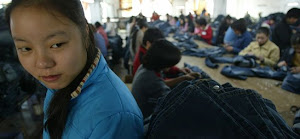Women's Rights as Human Rights:
Although Chihuahua's Attorney General has referred to the problem of murders of women as a "myth," a large pink cross filled with embedded nails and hanging nametags for each a victim sits in front of the Governor's office to remind authorities of the soaring numbers. In 2004, 31 women were brutally killed in Ciudad Juarez and Chihuahua, which represents a 58% increase compared to 2003. In January to March 2005 alone, six bodies have been found so far. Meanwhile, those tortured to confess to the murders sit in jail. --http://www.witness.org//index.php?option=com_rightsalert&Itemid=178&task=view&alert_id=38
This film is a almost perfect example of the mounted opposition to the advancement of women's rights to human rights. In this film we learn the story of Neyra Azucena Cervantes and her Cousin David Menza. Neyra was abducted in Chihuahua City. The police were useless for a month before they even began to post missing posters of Neyra. When David became heated with the Attorney General and challenged him, he was told that they would have a culprit very soon. A week later David was arrested for abducting, raping and killing his cousin.
Within recent years many have become aware of the violent killing of women in Juares and Chihuahua. This has been referred to as feminicide and has shined a spotlight on Mexico’s corrupt judicial system, lay enforcement, government and has also lead to some of the worst crimes against women by a nation. These women are trying to be erased. The Mexican authorities have been wrong, have tried to cover up their mistakes, and because of this there latest attempts have been to torture confessions out of men and falsify evidence to close cases. This is what happened in David Menza case, he was tortured with electric shock into signing a confession. What makes their actions in this case much more ridiculous s is the fact that David was in Chiapas, over one thousand miles away, when Neyra went missing.
This is a case of an entire nation trying to dispose of these women, erasing their stories of the local media and making all women invisible. Rather than admit that the authorities have made mistakes, somehow they feel that it would be easier to cover everything up. The women of Juarez and Chihuahua mean nothing. Many things have been attributed to these killings, the factories and their lack of safety, the excuse of women running around ‘asking for it,’ and on and on. This film does not deal with the causes so much but with what happens afterwards. There is already this huge risk to women in these cities but even after the violence the family and friends of the women are further subject to violation of their human rights. Despite the awareness of these crimes, it seems as though many, both in Mexico and not, tend to view violence towards women as a problem in the private sphere. As Jill Vikers explains in “Thinking about Violence” in the book “Gender, Race and Nation: A global perspective” women also experience violence in a broader range such as genocide. That is what is happening in Juarez and Chihuahua.
Subscribe to:
Post Comments (Atom)







No comments:
Post a Comment